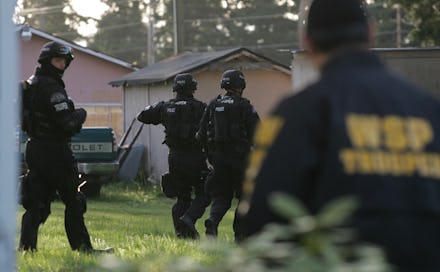The U.S. Is Spending Billions to Fight a Pointless War — And It's Not in Iraq or Afghanistan

America's police forces are becoming more and more militarized, and it's costing money and lives.
A new report from the America Civil Liberties Union dives into the deployment of SWAT teams by local and state police agencies, and the results aren't pretty. Out of 818 SWAT raids carried out in 11 states from 2010 to 2013, seven ended with civilians dying because of the raids. There were also 46 civilian injuries.
While SWAT teams were originally meant for riot control and active shooter situations, the study found that 62% of missions were actually drug searches, with 79% of raids involving private homes. Only 7% of raids lined up with how SWAT teams were intended to be used.
Learning from war: The changes in the way SWAT teams are deployed are thanks in large part to a transfer of materials and techniques from the U.S. military. A Pentagon program sends SWAT teams military equipment, providing local police forces with items such as automatic rifles, robots and armored vehicles from the war in Afghanistan.
It all adds up. The study found that Arizona alone had received 1,034 guns, 64 armored vehicles, 17 helicopters and tens of thousands more pieces of military equipment from the Department of Defense. In total, $4.3 billion worth of property has been distributed to police forces around the country.
Treating raids on private homes like military missions has consequences. An Iraq War veteran in Tucson was shot 22 times by a SWAT team when he brought a rifle to investigate why there were people standing outside. (No drugs were found at the house.) A mother holding her infant son was shot and killed when a SWAT team in Lima, Ohio broke down her door and opened fire. (Her boyfriend was suspected of dealing drugs.) A grandfather of 12 died in Framingham, Mass. after SWAT officers threw a flashbang grenade into the house and discharged a weapon. (His girlfriend's son was suspected of dealing drugs; he was arrested minutes before the raid even occurred.)
After our house burned down in Wisconsin a few months ago, my husband and I packed our four young kids and all our belongings into a gold minivan and drove to my sister-in-law’s place, just outside of Atlanta. On the back windshield, we pasted six stick figures: a dad, a mom, three young girls, and one baby boy.
That minivan was sitting in the front driveway of my sister-in-law’s place the night a SWAT team broke in, looking for a small amount of drugs they thought my husband’s nephew had. Some of my kids’ toys were in the front yard, but the officers claimed they had no way of knowing children might be present. Our whole family was sleeping in the same room, one bed for us, one for the girls, and a crib.
After the SWAT team broke down the door, they threw a flashbang grenade inside. It landed in my son’s crib.
Flashbang grenades were created for soldiers to use during battle. When they explode, the noise is so loud and the flash is so bright that anyone close by is temporarily blinded and deafened. It’s been three weeks since the flashbang exploded next to my sleeping baby, and he’s still covered in burns.
There’s still a hole in his chest that exposes his ribs. At least that’s what I’ve been told; I’m afraid to look.
A literal war on drugs: Most of the SWAT raids studied came looking for drugs and drug dealers. The paramilitary presence and occasional use of excessive force takes a much greater toll on some communities than others:
Image Credit: ACLU
Accidental deaths will happen in policing, but they're more likely when armored officers are breaking down doors, throwing grenades and wielding military rifles. The increasingly unpopular war on drugs does not need more casualties, and it certainly does not need military equipment shipped from the Middle East to our police departments.
America's cities and suburbs are not Afghanistan. Lives would be saved if police would stop treating them that way.